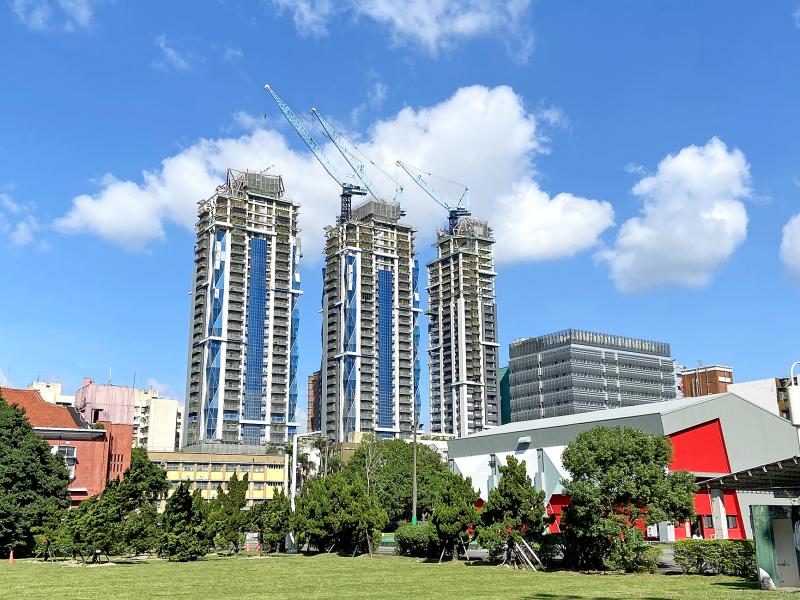Presale housing projects in northern Taiwan could see a 5 percent growth rate this year, to NT$1.34 trillion (US$47.13 billion), down from the 27 percent gain seen last year, as developers turn cautious in the wake of the central bank last month introducing selective credit controls, the Chinese-language My Housing Monthly said yesterday.
The central bank has capped the loan-to-value ratios for purchases by corporate and multiple home owners at 55 to 65 percent, as well as on unsold houses and land financing, in a bid to curb price hikes.
“The presale market has a chance of breaking records this year on the back of continued economic growth, excessive liquidity and low interest rates,” My Housing Monthly research manager Ho Shih-chang (何世昌) said.

Photo: Hsu Yi-ping, Taipei Times
Forecasters at home and abroad expect Taiwan’s GDP growth to reach between 3 and 4 percent this year, and the central bank has said that it would stay in tune with global peers on a loose monetary policy stance.
Developers, especially those in Hsinchu, would refrain from introducing new projects that require more capital in the wake of the central bank’s new measures, Ho said.
The projection, if materialized, would make it difficult to reverse housing price hikes because real demand is growing here due to the Hsinchu Science Park (新竹科學園區), the publication said.
Presale projects in Hsinchu last year fell 10 percent to NT$100 billion, weighed down by the COVID-19 pandemic.
A supply shortage accounted for the phenomenon of people waiting in line to buy new homes last year, he said.
Presale projects in northern Taiwan last year rose a total of 27 percent to NT$1.28 trillion, compared with the 13 percent increase seen in 2019, My Housing Monthly reported.
Taiwan’s effective control of the COVID-19 pandemic and its resilient economy has allowed the property market to stage a quick recovery, it said.

Real estate agent and property developer JSL Construction & Development Co (愛山林) led the average compensation rankings among companies listed on the Taiwan Stock Exchange (TWSE) last year, while contract chipmaker Taiwan Semiconductor Manufacturing Co (TSMC, 台積電) finished 14th. JSL Construction paid its employees total average compensation of NT$4.78 million (US$159,701), down 13.5 percent from a year earlier, but still ahead of the most profitable listed tech giants, including TSMC, TWSE data showed. Last year, the average compensation (which includes salary, overtime, bonuses and allowances) paid by TSMC rose 21.6 percent to reach about NT$3.33 million, lifting its ranking by 10 notches

SEASONAL WEAKNESS: The combined revenue of the top 10 foundries fell 5.4%, but rush orders and China’s subsidies partially offset slowing demand Taiwan Semiconductor Manufacturing Co (TSMC, 台積電) further solidified its dominance in the global wafer foundry business in the first quarter of this year, remaining far ahead of its closest rival, Samsung Electronics Co, TrendForce Corp (集邦科技) said yesterday. TSMC posted US$25.52 billion in sales in the January-to-March period, down 5 percent from the previous quarter, but its market share rose from 67.1 percent the previous quarter to 67.6 percent, TrendForce said in a report. While smartphone-related wafer shipments declined in the first quarter due to seasonal factors, solid demand for artificial intelligence (AI) and high-performance computing (HPC) devices and urgent TV-related orders

Prices of gasoline and diesel products at domestic fuel stations are this week to rise NT$0.2 and NT$0.3 per liter respectively, after international crude oil prices increased last week, CPC Corp, Taiwan (台灣中油) and Formosa Petrochemical Corp (台塑石化) said yesterday. International crude oil prices last week snapped a two-week losing streak as the geopolitical situation between Russia and Ukraine turned increasingly tense, CPC said in a statement. News that some oil production facilities in Alberta, Canada, were shut down due to wildfires and that US-Iran nuclear talks made no progress also helped push oil prices to a significant weekly gain, Formosa said

MINERAL DIPLOMACY: The Chinese commerce ministry said it approved applications for the export of rare earths in a move that could help ease US-China trade tensions Chinese Vice Premier He Lifeng (何立峰) is today to meet a US delegation for talks in the UK, Beijing announced on Saturday amid a fragile truce in the trade dispute between the two powers. He is to visit the UK from yesterday to Friday at the invitation of the British government, the Chinese Ministry of Foreign Affairs said in a statement. He and US representatives are to cochair the first meeting of the US-China economic and trade consultation mechanism, it said. US President Donald Trump on Friday announced that a new round of trade talks with China would start in London beginning today,